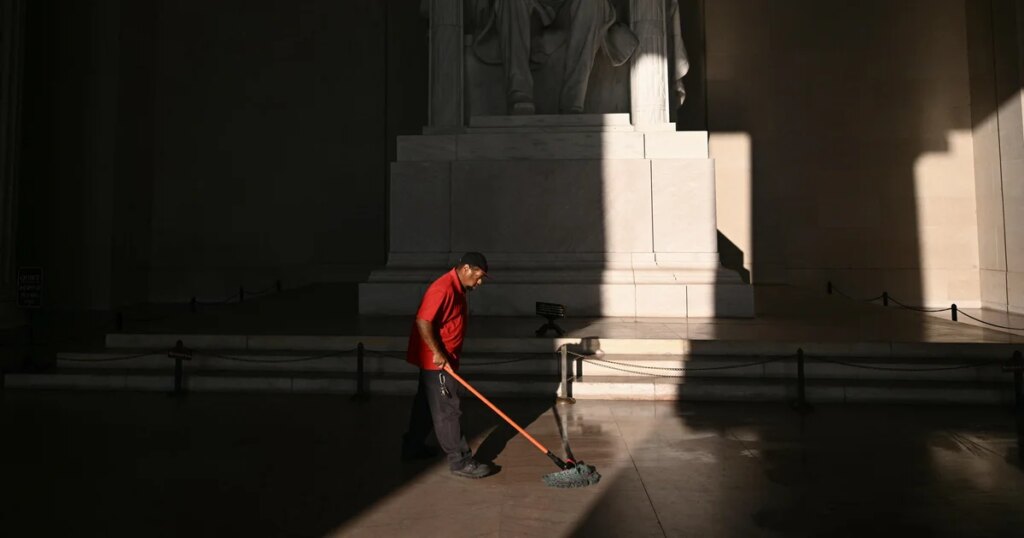Concern over a potential government shutdown has become a pressing issue for many Americans, transcending party lines. Polling indicates that neither party’s stance seems justified enough to warrant a cessation of government functions, resulting in a decline in political favorability for both Democrats and Republicans. As discussions continue, public opinion increasingly revolves around economic impacts, particularly inflation, and the degree to which the government focuses on pressing concerns such as healthcare and social programs.
| Article Subheadings |
|---|
| 1) Public Sentiment on Shutdown |
| 2) Economic Concerns Take Center Stage |
| 3) Political Party Perceptions |
| 4) Impact on Federal Employees and Services |
| 5) Concluding Insights on Political Dynamics |
Public Sentiment on Shutdown
Recent polls suggest that a significant portion of the American public is uneasy regarding the prospect of a government shutdown. A consensus appears to be forming that neither the Democratic nor the Republican Party’s positions justify the disruption associated with a shutdown. Only half of self-identified Democrats believe that their party’s arguments warrant a shutdown, while even fewer Republicans support their party’s stance in this contentious debate. This lack of confidence reflects broader anxieties about the direction of national policy and governance.
Economic Concerns Take Center Stage
At the forefront of public discourse during this crisis are economic concerns, particularly inflation and its repercussions on daily life. Polling indicates that Americans overwhelmingly prioritize economic stability and express dissatisfaction with how the Trump administration is handling inflation. Many believe that the administration’s focus on tariffs detracts from addressing the pressing issues of rising prices. A rising tide of concern about economic impact highlights how deeply interwoven public sentiment is with financial wellbeing, making the stakes of a shutdown even more perilous.
Political Party Perceptions
The perceptions of political parties have also taken a hit during the ongoing discussions about a possible governmental shutdown. Descriptors assigned to the Democratic Party include “weak,” while the Republican Party is often associated with being “extreme.” Notably, both parties feature underwater favorability ratings, meaning that their disapproval exceeds approval. Such negative perceptions could have far-reaching implications for each party’s future electoral prospects, especially considering that voters desire effective governance and may reject options that appear ineffective or divisive.
Impact on Federal Employees and Services
Additionally, the effects of a government shutdown concern not only economic stability but also federal employees and public services. While the attention primarily focuses on broader economic impacts, many Americans recognize that shutdowns tend to disrupt essential services like Social Security and Medicare, even if these programs are not directly involved in the negotiations. Concerns extend to federal employees who face uncertainty during these crises, with many reporting anxieties about job security and income stability amid government industrial politicking.
Concluding Insights on Political Dynamics
As the political landscape continues to evolve, it is essential to understand the overall impact of public sentiment on policy discussions. The prevailing mood suggests a hunger for genuine responsiveness from leaders who will prioritize the needs of the populace above partisan bickering. As Americans brace for the possibility of a government shutdown, the call for unified, effective representation is louder than ever, signaling a potential shift in how future policies could be crafted and negotiated.
| No. | Key Points |
|---|---|
| 1 | Public opinion shows a general lack of support for a government shutdown regardless of party affiliation. |
| 2 | Economic issues, particularly inflation, dominate concerns among voters. |
| 3 | Both Democrats and Republicans are perceived negatively, with terms like “weak” and “extreme” used to label them. |
| 4 | Federal employees and essential services are also at risk in the event of a shutdown, deepening public concerns. |
| 5 | The need for effective governance is more critical than ever, as the public demands accountability from their leaders. |
Summary
In conclusion, the looming threat of a government shutdown has triggered widespread apprehension among the American public, who are increasingly conscious of the potential economic ramifications. With both major parties failing to garner substantial support for their positions, the spotlight is now on the pressing need for effective governance to address the nation’s critical issues. The situation serves as a timely reminder that political divisions must not overshadow the collective responsibility toward the welfare of all citizens.
Frequently Asked Questions
Question: What are the main concerns about a government shutdown?
The primary concerns include economic impact, disruption of essential services, and job security for federal employees, as well as the potential long-term effects on public trust in government.
Question: How do Americans feel about their political parties during the shutdown?
Public sentiment indicates a generally negative view of both major political parties, with many describing the Democrats as “weak” and the Republicans as “extreme.” This reflects a broader dissatisfaction with political representation.
Question: What is the public’s perception of the Trump administration’s handling of economic issues?
Many Americans believe that the Trump administration is not adequately focused on lowering inflation and is instead prioritizing tariffs. Overall, this has led to declining approval ratings for the administration regarding economic management.


